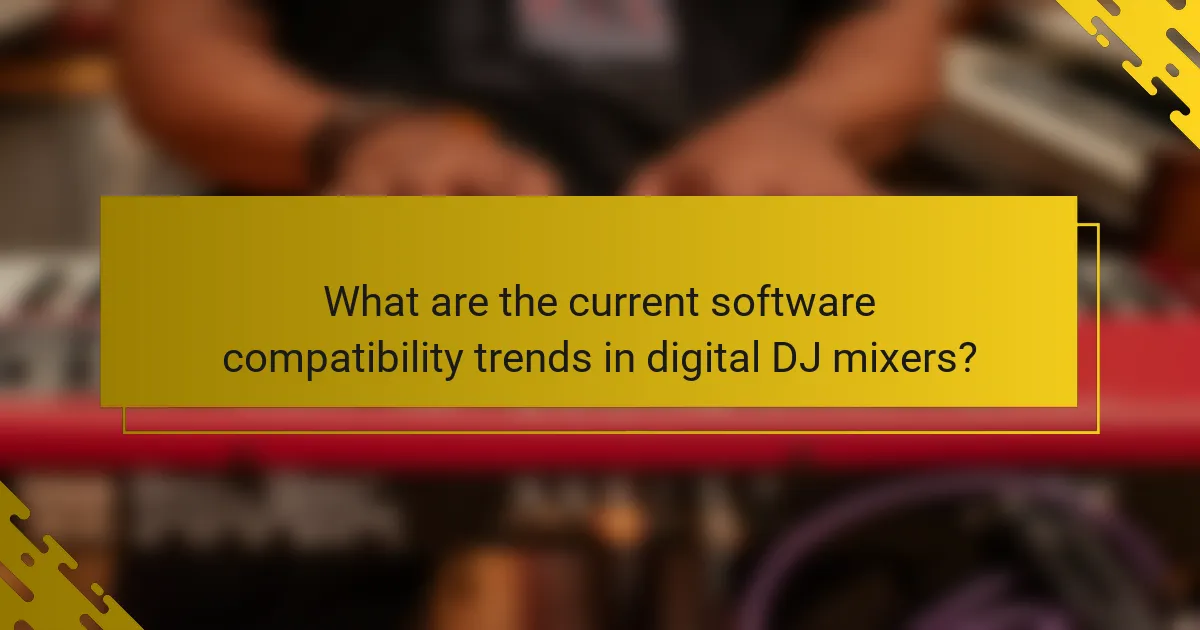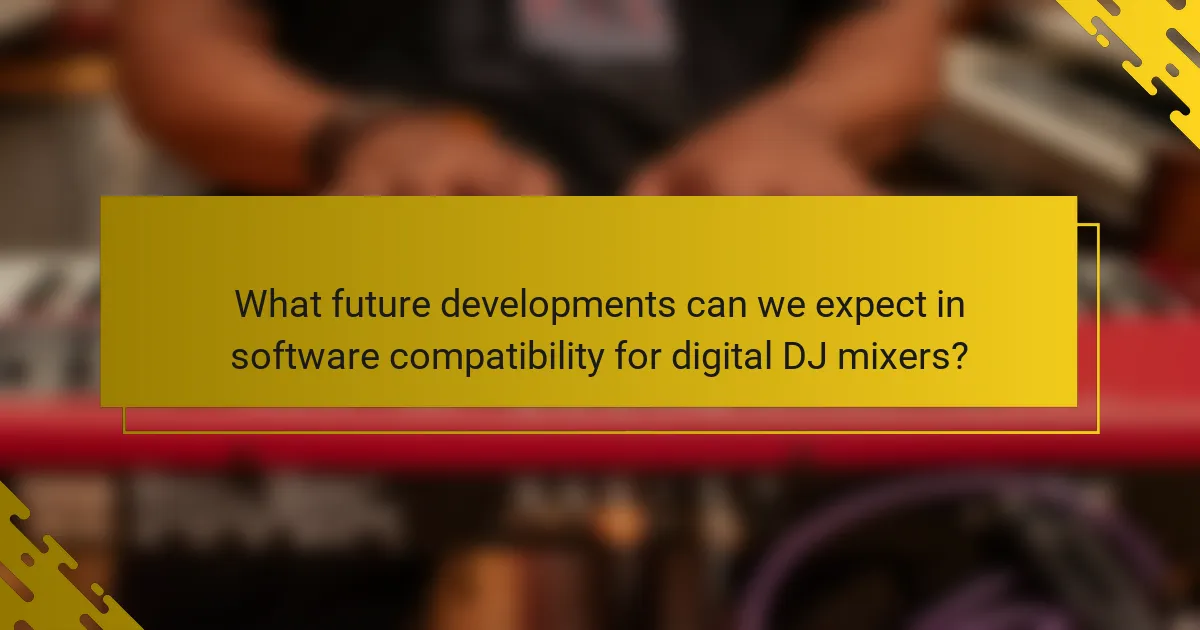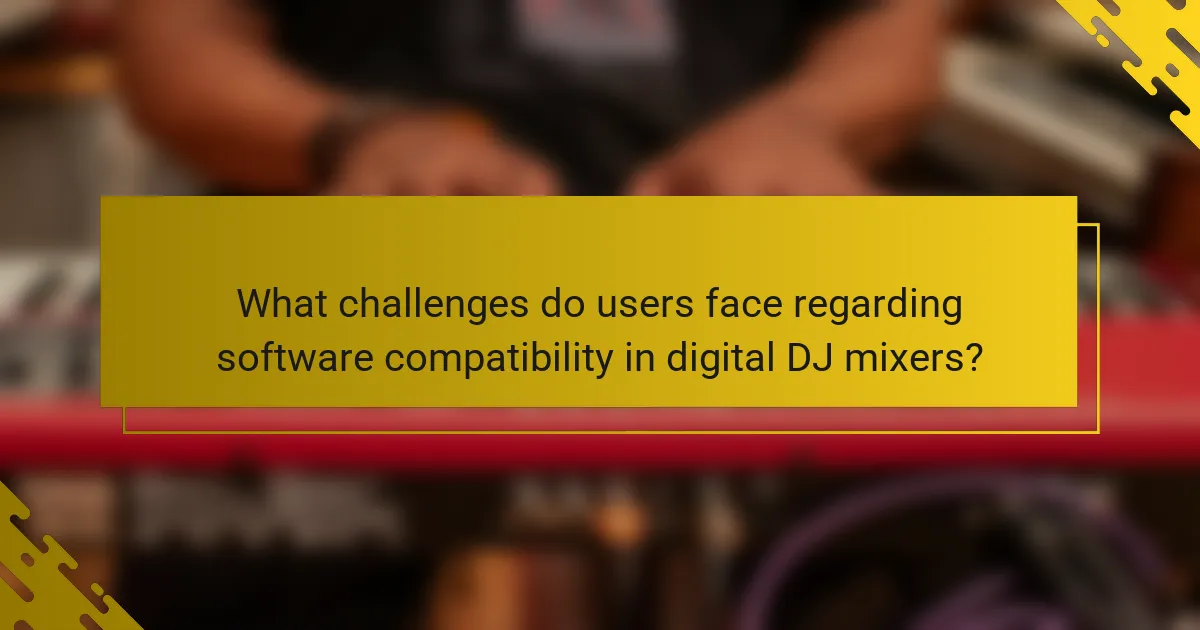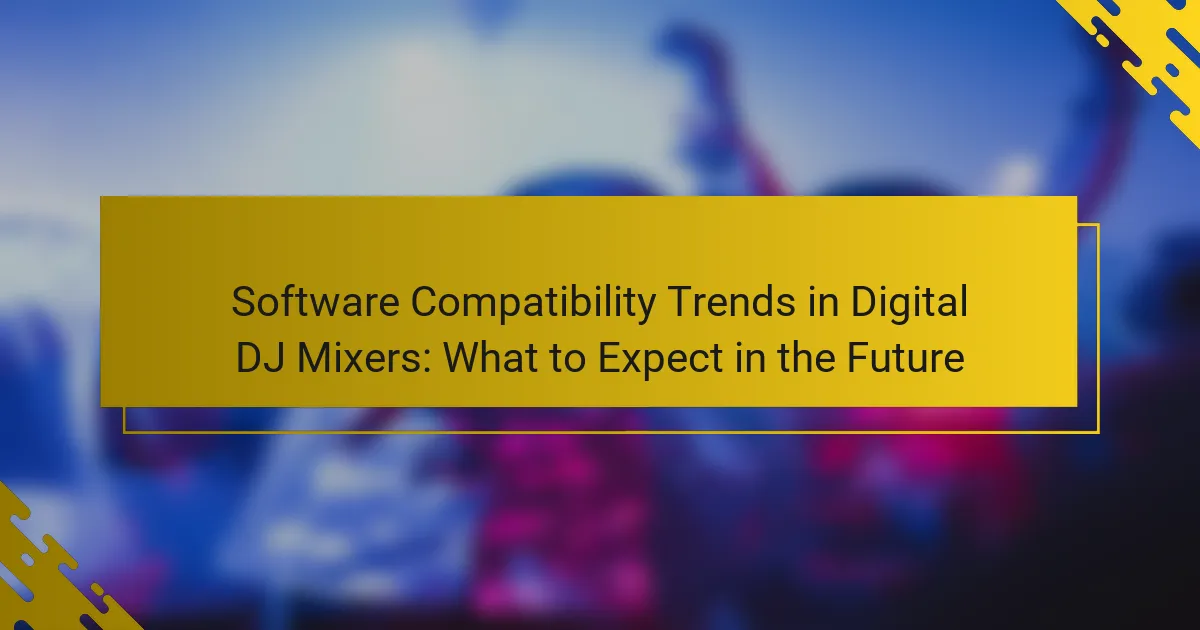Digital DJ mixers are increasingly focused on software compatibility, integrating with popular platforms such as Serato, Traktor, and Rekordbox to offer DJs seamless transitions between software. Enhanced MIDI mapping capabilities allow for custom configurations, while cloud-based features provide easy access to music libraries and updates. Future developments will likely include improved compatibility with streaming services, advancements in open-source software, and AI-driven enhancements to performance. However, users face challenges like inconsistent software standards across brands, temporary incompatibilities due to updates, and limitations based on operating systems. Addressing these issues is essential for maintaining functionality and performance in the evolving DJ landscape.

What are the current software compatibility trends in digital DJ mixers?
Current software compatibility trends in digital DJ mixers focus on integration with popular DJ software. Many mixers now support multiple software platforms, including Serato, Traktor, and Rekordbox. This trend allows DJs to switch between software seamlessly. Enhanced MIDI mapping capabilities are also prominent. They enable custom configurations for various software applications. Cloud-based features are increasingly included, providing access to music libraries and updates. Additionally, firmware updates are often released to improve compatibility with new software versions. This adaptability is crucial for professional DJs who require flexibility in their setups. The trend reflects a growing demand for versatile and user-friendly equipment in the DJ industry.
How do software updates impact the functionality of digital DJ mixers?
Software updates enhance the functionality of digital DJ mixers by introducing new features and improving existing ones. These updates can optimize performance and stability, ensuring seamless operation during live performances. For instance, updates may include bug fixes that resolve prior issues affecting sound quality or connectivity. Additionally, new effects and sound processing algorithms can be added, expanding creative possibilities for DJs. Compatibility with the latest music software and hardware is often improved through updates. This ensures that mixers can integrate with new technologies, such as advanced controllers and audio interfaces. Regular updates also help maintain security, protecting devices from vulnerabilities. Overall, software updates are essential for keeping digital DJ mixers current and effective in a rapidly evolving music landscape.
What types of software updates are most common for digital DJ mixers?
The most common types of software updates for digital DJ mixers include firmware updates, driver updates, and application updates. Firmware updates enhance the functionality and performance of the mixer. They often fix bugs and improve stability. Driver updates ensure compatibility with operating systems and other hardware. Application updates provide new features and improve user interfaces. These updates are essential for maintaining optimal performance. Regular updates also help in integrating new audio formats and technologies. Many manufacturers release updates periodically to address user feedback and industry trends.
How frequently do manufacturers release software updates?
Manufacturers typically release software updates every few months. This frequency can vary based on the manufacturer and the product. Some brands may issue updates quarterly, while others may do so biannually or annually. Critical updates for security or major bugs may be released more frequently. For example, a study by TechRadar indicates that leading manufacturers prioritize timely updates to enhance user experience and maintain product performance. Regular updates ensure compatibility with new technologies and address user feedback effectively.
What role do operating systems play in software compatibility for digital DJ mixers?
Operating systems are crucial for software compatibility in digital DJ mixers. They determine how software applications interact with hardware components. Different operating systems, such as Windows, macOS, and Linux, support various drivers and software versions. Compatibility issues can arise when software is designed for a specific operating system. For example, a DJ software may run smoothly on Windows but not on macOS. Additionally, updates to an operating system can affect the performance of DJ software. Manufacturers often release software updates to maintain compatibility with the latest operating systems. This ensures that users can access new features and improvements. Therefore, the choice of operating system significantly impacts the overall functionality of digital DJ mixers.
Which operating systems are most commonly used with digital DJ mixers?
The most commonly used operating systems with digital DJ mixers are Windows and macOS. Windows is prevalent due to its compatibility with various DJ software. Many popular DJ applications run seamlessly on Windows. macOS is favored by many professional DJs for its stability and performance. Both operating systems support a wide range of digital DJ mixers and software integrations. Additionally, some mixers offer compatibility with Linux, although this is less common. The choice of operating system often depends on personal preference and the specific DJ software used.
How do different operating systems affect the performance of DJ software?
Different operating systems significantly impact the performance of DJ software. Each operating system has unique resource management and compatibility features. For instance, Windows often provides broader hardware support, leading to better integration with various DJ controllers. macOS is known for its stability and optimized performance with professional audio applications. Linux can offer high customization but may lack support for some popular DJ software. Performance can also be affected by the underlying architecture of the operating system, with 64-bit systems generally providing better performance than 32-bit versions. Additionally, the latency levels and audio processing capabilities differ across operating systems, influencing real-time performance during live sets. Compatibility with drivers and plugins is another critical aspect, as some software may perform better on specific operating systems due to optimized coding.

What future developments can we expect in software compatibility for digital DJ mixers?
Future developments in software compatibility for digital DJ mixers will focus on enhanced integration with various platforms. Expect improved compatibility with streaming services like Tidal and Beatport. Additionally, advancements in open-source software will allow for more customizable features. Innovations in MIDI protocols will facilitate better communication between devices. Cloud-based solutions will enable seamless updates and access to new features. Increased support for mobile applications will provide more flexibility for DJs. Finally, AI-driven software will enhance performance capabilities and personalizations for users. These trends are backed by growing industry demands for versatility and user-friendly experiences.
How is cloud technology influencing software compatibility in digital DJ mixers?
Cloud technology enhances software compatibility in digital DJ mixers by enabling seamless updates and integrations. It allows users to access the latest software versions and features instantly. This connectivity ensures that mixers can work with a wide range of music libraries and streaming services.
Additionally, cloud technology supports collaborative features, allowing DJs to share settings and playlists easily. This fosters a more adaptable environment for live performances and studio work. According to a 2022 survey by DJ Tech Tools, 75% of DJs reported improved performance due to cloud-based software compatibility.
Overall, cloud technology is crucial for maintaining up-to-date and versatile software in digital DJ mixers.
What are the benefits of cloud-based software for DJs?
Cloud-based software offers several benefits for DJs. It provides easy access to music libraries from any device with internet connectivity. DJs can collaborate in real-time with other artists, enhancing creativity. Cloud storage ensures secure backup of music files and settings. Automatic updates keep software current without manual intervention. Additionally, it allows for easy sharing of playlists and set lists with clients or other DJs. The scalability of cloud solutions accommodates growing music collections without hardware limitations. These features streamline workflow and enhance performance capabilities for DJs.
How might cloud technology change the way DJs manage their libraries?
Cloud technology can significantly enhance how DJs manage their libraries. It allows for real-time access to music collections from any device. DJs can store vast amounts of music without physical constraints. This technology facilitates automatic updates of music libraries. It also enables seamless sharing of playlists and tracks with other DJs. Cloud services often provide advanced search and organization tools. DJs can collaborate remotely, improving creativity and workflow. Overall, cloud technology streamlines library management, making it more efficient and flexible.
What emerging technologies could affect software compatibility in the future?
Emerging technologies that could affect software compatibility in the future include artificial intelligence, blockchain, and cloud computing. Artificial intelligence can enable adaptive software that learns user preferences, potentially creating compatibility issues with existing systems. Blockchain technology may introduce new protocols for data sharing, which could require software updates for compatibility. Cloud computing can shift software dependencies to online services, affecting how traditional software interacts with hardware. Additionally, the rise of augmented reality and virtual reality could necessitate new software frameworks, impacting compatibility with current systems. These technologies are rapidly evolving and may reshape the landscape of software compatibility in various industries.
How will AI and machine learning enhance DJ software compatibility?
AI and machine learning will enhance DJ software compatibility by enabling automatic integration with various hardware and software platforms. These technologies analyze user preferences and optimize performance across different systems. They facilitate real-time data exchange, ensuring seamless communication between devices. Machine learning algorithms can predict compatibility issues before they arise. This predictive capability reduces setup time and enhances user experience. Additionally, AI can adapt software features based on user behavior, tailoring functionalities to individual needs. As a result, DJs benefit from a more cohesive and efficient working environment.
What potential does virtual reality hold for digital DJ mixers?
Virtual reality (VR) has significant potential for digital DJ mixers. It can create immersive environments for DJs and audiences. VR enables interactive performances that engage users in unique ways. DJs can manipulate virtual turntables and effects in a 3D space. This technology can enhance user experience through visual feedback and real-time collaboration. Research shows that immersive experiences can increase audience engagement by up to 60%. Additionally, VR can allow remote collaborations between DJs across the globe. This opens new avenues for live performances and events. Overall, VR can redefine how DJs interact with their craft and audiences.

What challenges do users face regarding software compatibility in digital DJ mixers?
Users face several challenges regarding software compatibility in digital DJ mixers. One major issue is the lack of standardized software across different brands. This inconsistency can lead to difficulties in integrating various hardware components. Users often experience compatibility issues when trying to use third-party software with their mixers. Additionally, frequent software updates can create temporary incompatibilities. Some mixers may only support specific operating systems, limiting user options. Furthermore, users may struggle with driver installation and configuration. These challenges can hinder performance and limit functionality for DJs. Overall, software compatibility remains a significant concern for digital DJ mixer users.
What common compatibility issues do DJs encounter with their mixers?
DJs commonly encounter issues with mixer compatibility related to software integration, hardware connections, and driver support. Software compatibility issues arise when DJ software does not fully support the mixer’s features. This can limit functionality and affect performance. Hardware connection problems often occur with different cable types or incompatible ports. For example, some mixers may require specific USB standards that older laptops do not support. Driver support is another critical factor. If the mixer’s drivers are outdated or not available for the current operating system, it can lead to malfunction. These compatibility issues can hinder a DJ’s ability to perform effectively.
How can DJs troubleshoot software compatibility problems?
DJs can troubleshoot software compatibility problems by verifying system requirements. They should check if their hardware meets the software’s specifications. Updating drivers and software can resolve many issues. DJs should also ensure that their operating system is compatible with the software version. Testing different USB ports can help identify connection problems. Additionally, consulting user forums may provide solutions from other DJs. Reinstalling the software can fix corrupted files. Finally, reaching out to customer support may offer specific guidance for unique issues.
What resources are available for DJs facing compatibility issues?
DJs facing compatibility issues can access several resources. Online forums and communities like DJ TechTools provide peer support and troubleshooting advice. Software documentation from manufacturers often includes compatibility guides. YouTube tutorials can offer visual solutions to common problems. Customer support from software companies can assist with specific inquiries. Compatibility check tools are available on many software websites. Additionally, professional DJ associations may offer resources and workshops. These resources help DJs navigate and resolve compatibility challenges effectively.
What best practices can DJs follow to ensure software compatibility?
DJs can ensure software compatibility by regularly updating their software and firmware. Keeping software current prevents issues with outdated features. DJs should also verify system requirements for each software application. This ensures that their hardware meets the necessary specifications. Utilizing industry-standard software can enhance compatibility across different platforms. DJs should test their setups before live performances. This practice helps identify potential conflicts early. Additionally, reading user reviews and forums can provide insights into compatibility issues. Engaging with the software community offers tips and solutions for common problems.
How can DJs keep their software up to date effectively?
DJs can keep their software up to date effectively by regularly checking for updates from their software providers. Most DJ software has an automatic update feature. This feature notifies users when new versions are available. DJs should also subscribe to newsletters or forums related to their software. These platforms often announce updates and new features. Additionally, DJs can follow social media channels of their software companies. This ensures they receive timely information on updates. Regularly updating software enhances performance and compatibility with new hardware. Keeping software current helps avoid technical issues during live performances.
What should DJs consider when choosing compatible software for their mixers?
DJs should consider the software’s compatibility with their specific mixer model. This ensures seamless integration and functionality. They need to check for supported audio formats and protocols. Common formats include MP3, WAV, and AIFF. Additionally, latency performance is crucial for real-time mixing. DJs should evaluate the software’s user interface for ease of use. Compatibility with external hardware, such as controllers, is also important. Lastly, regular software updates and community support enhance longevity and usability. These factors collectively ensure optimal performance and user experience.
The main entity of this article is digital DJ mixers, specifically focusing on their software compatibility trends. The article examines current trends in software integration, including support for popular platforms like Serato, Traktor, and Rekordbox, as well as the impact of software updates on functionality and performance. It discusses the role of operating systems in compatibility, common challenges faced by DJs, and emerging technologies such as cloud computing and AI that could shape future developments. Additionally, it provides best practices for maintaining software compatibility and troubleshooting issues, ensuring DJs can effectively manage their setups.
